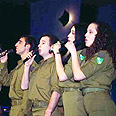
IDF female soldiers singing at ceremony
צילום:משה מילנר, לע"מ
Skirts out, radicalism in
Op-ed: Dark wave of extremism has swept over religious Zionist camp in past few decades
I wasn’t able to vote in the 1984 elections. I was only 17, a student at Gymnasia Rehavia in Jerusalem, and active in the Tzofim (scouts.) My grades weren’t exactly the best in the class, but I was a political junkie. In the aftermath of the first Lebanon war, emotions were running high. Not to mention hormones. There wasn’t a demonstration or protest that we failed to attend.
I had formed well-thought-out political opinions, and I knew how to talk about them with enthusiasm and impassioned conviction. That’s the way it is when you grow up in Jerusalem. Everything is political. We talked about politics, breathed it, and when we got fed up with arguing among ourselves, we began to talk about our parents. What party is your father voting for? And what about your mother?
Most of the parents in the secular neighborhood where I grew up voted for leftist parties. Yaniv’s father was a well-known Labor supporter. His grandfather had been active in Mapai, Labor’s precursor. But what about Efrat’s parents, they supported Likud and her father was even a member of the party’s central committee. When the conversation turned to our parents, I tensed up. I was hiding a dark secret. My mother was planning to vote for the NRP (National Religious Party.)
I was born many years after my father had left the Orthodox fold and become secular, but both of my parents came from Orthodox homes. They met in B’nai Akiva (the religious Zionist youth movement) and had even been members of the religious kibbutz movement for a few years. My father studied at the Kfar Haroe Yeshiva, the leading religious Zionist yeshiva. But I was born into an entirely secular home. Then suddenly my mother declares that she is going to vote NRP (National Religious Party.) Mom, have you gone crazy?
The way we were…
As I expected, the political clique I belonged to hounded me about it. There wasn’t one meeting or scouts activity I went to when I was not greeted with the NRP’s catchy election jingle, with a twist: They worked my mother’s name into the rhymed tune. I didn’t get mad at them. I knew that I would have done the same thing in their place. That’s how we were.This week someone sent me a video clip of the original NRP election ad from that year. Watching it gave me a shock. After all these years, I had forgotten how different religious Zionism had been back then. In the clip you see young women in skirts that were above (yes above!) the knee. There were even a few girls in pants, tee shirts with short sleeves.
You could see teenage boys and girls running together in a B’nai Akiva activity. And, heaven help us, there were even girls standing on a stage and singing. Just like that, standing and singing, as if Rabbi Levanon (“under no circumstances”) never existed.
Less than 30 years have gone by, but today, there is absolutely no way that the head of a National Religious Party election campaign would produce a television ad like this. This footage would be left on the floor of the editing room.
Obsession with modesty
A dark wave of extremism has swept over the religious Zionist camp in the past few decades and destroyed so much in its wake. The obsession with modesty, which had at one time been the exclusive purview of the ultra-Orthodox, has long since moved to center stage. It has focused on adult women, then teenagers, and now girls in first grade who are not allowed to dance at their end-of-the year party in front of their fathers.When you are taught, already as a young girl, to cover your body in a severe manner and told that you cannot sing in front of men because your voice is an abomination like nudity, you and your male classmates (in a separate classroom because there are almost no mixed classes any more) understand that a woman is nothing more than a sex symbol and that her sole purpose is to tempt men.
It is regrettable that the acceptance of this view, which has completely taken over B’nai Akiva, is slowly seeping into other areas as well. The fact that the youth movements in Kfar Saba agreed to the request made by B’nai Akiva and did not allow a woman to sing a solo at their joint gathering is a dangerous and troubling step in this process.
A woman can stand on a stage by herself. She doesn’t need additional voices, of men or other women to sing along with her in order to be considered “kosher.” Anyone who adopts these kinds of solutions, considered to be a fair compromise under the pretext of conciliation doesn’t understand the essence of the matter.
We are not talking about a woman’s singing, but about the ability of a woman to conduct herself in this world as if it belongs to her, too. It would be unthinkable to accept such a compromise in the academic world, in the army, in the justice system, in medicine. Or maybe it would.
Yizhar Hess is the Executive Director & CEO of the Masorti Movement










